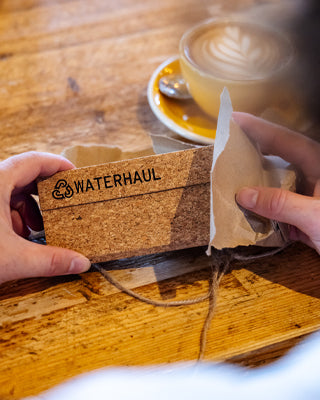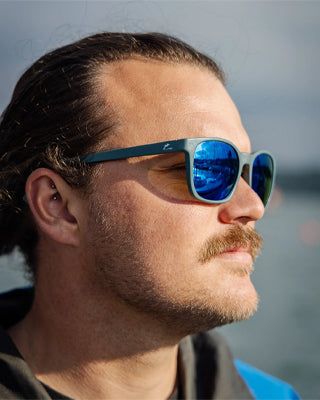
Antony Boffey
September 23, 2024
Fishing Net Recycling in the UK
Turning Ocean Waste into Opportunity.
At Waterhaul, we're passionate about addressing one of the ocean's most pressing challenges: the proliferation of ghost gear.
Ghost gear often comes from abandoned or damaged fishing gear that continues its deadly purpose. We also view end of life fishing gear as a key consideration, as there are limited recycling solutions. Recycling end of life fishing gear before it becomes “ghost gear” in the traditional sense of the word, is another one of our fundamental focuses. Join us as we explore the world of fishing net recycling in the UK, a journey that transforms environmental threats into innovative solutions.
The Net Problem: A Growing Concern for Our Oceans
Imagine walking along a pristine UK coastline, only to encounter a tangled mass of synthetic rope and netting washed ashore. This sight, unfortunately all too common, represents just a fraction of a much larger issue plaguing our oceans.
Fishing nets, particularly those crafted from synthetic materials like polypropylene, high-density polyethylene and Nylon, have become a significant threat to marine ecosystems. According to a study by the Food and Agriculture Organization of the United Nations, fishing nets constitute an alarming 46% of the Great Pacific Garbage Patch [1]. These "ghost nets" continue their destructive path long after being lost or discarded, ensnaring and harming marine life indiscriminately.
The UK, with its rich maritime heritage and active fishing industry, is not immune to this challenge. In 2019, the Marine Management Organisation reported that UK vessels landed 622,000 tonnes of sea fish [2]. This substantial fishing activity inevitably leads to a considerable amount of potential net waste.
From Sea to Shore: Tracing the Path of Abandoned Fishing Gear
The journey of these nets from active use to marine debris is complex. While some nets are lost accidentally during storms or when snagged on underwater obstacles, others are deliberately discarded when damaged beyond repair.
In the UK, initiatives like Fishing for Litter play a crucial role in addressing this issue. This project encourages fishermen to bring ashore the litter they catch during their normal fishing activities [3]. Not only does this help clean our seas, but it also provides a steady stream of material for recycling efforts.
At Waterhaul, we see these collected nets not as waste, but as an opportunity for transformation. This is where the innovative process of recycling comes into play, turning potential pollutants into valuable resources.

The Science of Recycling: Transforming Nets into New Materials
The process of recycling fishing nets is a testament to human ingenuity and technological advancement. While it might seem like a straightforward concept, the reality involves a series of complex steps:
- Collection: We collaborate with fishers, harbour masters and partners along the UK coastline to gather discarded and end of life fishing nets and ghost gear. These are then taken into our own facility within the UK to begin the cleaning process.
- Cleaning: The nets undergo thorough cleaning to remove salt, sand, and organic matter.
- Sorting: Different types of plastics are separated, as most fishing nets are composed of nylon, polypropylene and high density polyethylene or other synthetic materials.
- Shredding: Clean nets are then cut into small, manageable pieces.
- Melting and Extruding: The plastic is then melted down and formed into pellets.
- Manufacturing: These pellets become the raw material for creating new products.
Each step in this process requires meticulous attention to detail and stringent quality control. Our goal isn't just to recycle; it's to upcycle - elevating low-value waste into high-value, desirable products, that are ocean positive. At Waterhaul, recycling the fishing nets in the UK does not just focus on the actual process. We want to be able to trace our material all the way through the process. Every batch of netting that is collected, is recorded with Geo location data. During the recycling process we analyse the nets to find out what material they each consist of. This data is then also added to each batch of netting collected. As a result, any batch number can be traced back to its origins with our Traceable Marine Plastic.
Beyond Eyewear: The Expanding World of Recycled Net Products
While Waterhaul is renowned for our product range from performance-ready adventure sunglasses, to our litter picking equipment and utility knives, the potential applications for these materials extend far beyond eyewear. In 2024, we made our recycled plastic commercially available to other brands, manufacturers and creators in order to scale both the demand and impact of our fishing gear recovery and recycling scheme.
Each product made from recycled nets serves as a tangible reminder of our commitment to ocean conservation and sustainable innovation. Waterhaul recently launched our plastic pellets in the form of our Traceable Marine Plastic. This Traceable Marine Plastic is already being used for a wide range of applications from wet suit hangers, to pet products. Due to the properties of the plastics used in the original fishing nets, with some nets lasting over 500 years, there is no reason why products already being made using these materials should be made from virgin plastics.
Recycling fishing nets provides the same material properties required for numerous applications whilst at the same time, actually making a direct impact on the ocean. We've created a detailed guide on ghost gear and how it is having an impact on our oceans, which can be found here. Quite simply, we need to make a difference and it has to happen now before there is the point of no return.

The Ripple Effect: The Far-Reaching Benefits of Fishing Net Recycling
The impact of fishing net recycling extends far beyond the immediate removal of waste from our oceans. Let's explore the multifaceted benefits of this practice:
- Marine Conservation: Every recycled net represents one less hazard in the ocean, potentially saving countless marine animals from entanglement.
- Resource Efficiency: Recycling nets reduces the demand for virgin plastics, conserving oil and decreasing carbon emissions. The Ellen MacArthur Foundation estimates that recycling one tonne of nylon saves 7 barrels of crude oil and prevents 4.1 tonnes of CO2 emissions compared to virgin nylon production [6].
- Economic Growth: The recycling industry creates jobs and opens up new markets for sustainable products. In the UK, the waste and recycling sector supports over 120,000 jobs [7]. At Waterhaul our entire process is UK based.
- Public Awareness: Products made from recycled nets serve as conversation starters, raising awareness about ocean pollution and inspiring action.
- Circular Economy: By transforming waste into resources, we're contributing to a more circular and sustainable economic model.
Navigating Challenges and Charting Future Directions
While the benefits of fishing net recycling are clear, the path forward is not without obstacles:
- Logistical Complexities: Collecting nets from diverse coastal locations presents logistical challenges and can be costly.
- Material Contamination: Nets often contain mixed materials or organic matter, which can complicate the recycling process.
- Market Development: While growing, the market for recycled net products is still in its early stages.
However, we remain optimistic. Advancements in recycling technology, increasing consumer awareness, and supportive policies are helping to overcome these hurdles. The UK government's 25 Year Environment Plan, which includes commitments to reduce marine plastic pollution, provides a supportive framework for these efforts [8].

Joining the Movement: How You Can Support Fishing Net Recycling
As we continue to develop and refine fishing net recycling processes, public support and engagement are crucial. Here are several ways you can contribute to this important cause:
- Conscious Consumerism: Choose brands such as Waterhaul where the products are made from recycled plastic fishing nets.
- Awareness Raising: Share information about net recycling with your network to increase public understanding. Whilst some people only visit the beaches and coastline during their holidays, the problem is a year round issue. According to the CIA Factbook, the length of the UK coastline is around 12,429 km or 7,723 miles. According to the World Resources Institute, the length is around 19,717 km.
- Community Action: Participate in or organise local beach clean-ups to prevent nets from re-entering the sea. Even if you do not live near the coast, participating in litter picks, helps prevent ocean bound plastic from reaching waterways and the ocean.
- Policy Support: Advocate for policies that promote recycling and reduce plastic waste in our oceans.
Remember, each individual action contributes to the larger movement towards cleaner oceans and more sustainable practices.
Conclusion: Weaving a Sustainable Future
Fishing net recycling in the UK represents more than an environmental initiative; it's a movement towards a more sustainable, circular future. From Cornwall's shores to Scotland's coasts, we're transforming a significant environmental threat into an opportunity for innovation, education, and positive change.
At Waterhaul, we take pride in our role in this movement, turning ghost nets into functional, desirable accessories. More importantly, we're proud of the community we're building - individuals who care deeply about our oceans and are committed to taking action.
The next time you use a product made from recycled fishing gear, remember that you're not just holding an item. You're holding a piece of the ocean, rescued, transformed, and given new purpose. It's a testament to human ingenuity and our collective commitment to environmental stewardship.
As we continue to innovate and expand the possibilities of fishing net recycling, we invite you to join our community in this crucial endeavour. Together, we can turn the tide on ocean pollution and create a more sustainable future for our seas.
References
- [1] FAO. "Microplastics in fisheries and aquaculture: Status of knowledge on their occurrence and implications for aquatic organisms and food safety." 2017.
- [2] Marine Management Organisation. "UK Sea Fisheries Statistics 2019." 2020.
- [3] KIMO. "Fishing for Litter." https://www.fishingforlitter.org.uk/
- [5] Suhendro, B. "Toward green concrete for better sustainable environment." Procedia Engineering, 2014.
- [6] Ellen MacArthur Foundation. "The New Plastics Economy: Rethinking the future of plastics." 2016.
- [7] Department for Environment, Food & Rural Affairs. "Resources and waste strategy for England." 2018.
- [8] HM Government. "A Green Future: Our 25 Year Plan to Improve the Environment." 2018.

